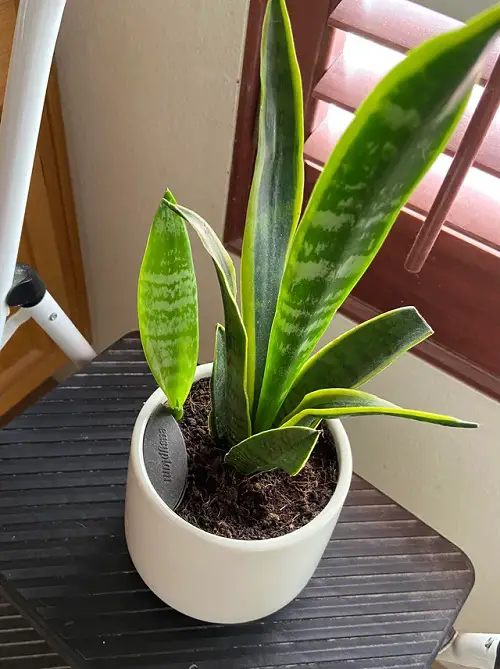Is your snake plant turning yellow? Don’t have any idea what could be the reason behind it? Here’s what you need to do!
Snake plants are almost indestructible when you give them the right growing conditions. However, if you neglect them fully, they can turn yellow and die. To save yours from going on the same path, we have some tricks!
Snake Plant Leaves Turning Yellow: Reasons and Solutions
1. Over and Under Fertilization
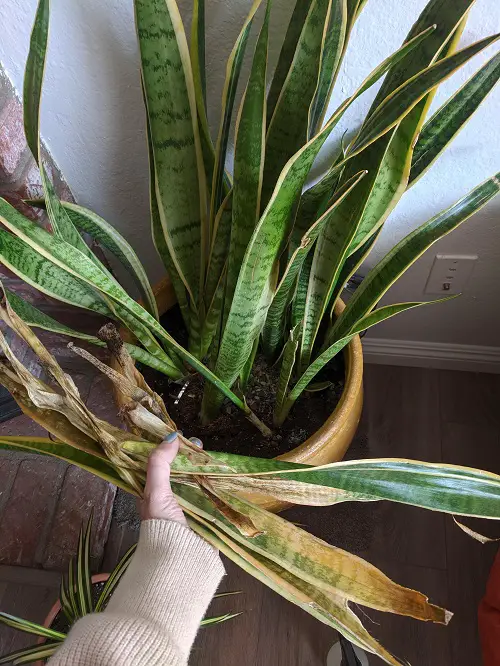
Overfertilizing snake plants can be detrimental to their health, just as under-fertilizing can be. People have a habit of feeding the plant too much, which works against it, making the foliage yellow and droopy.
All you need to do, is fertlize using a balanced liquid feed (10-10-10), after diluting it to 1/2 of its strength, once in 4-6 weeks. This will support its growth, giving it the right boost it needs for plump and healthy leaves, without the fears of overfeeding it.
2. Over and Under Watering
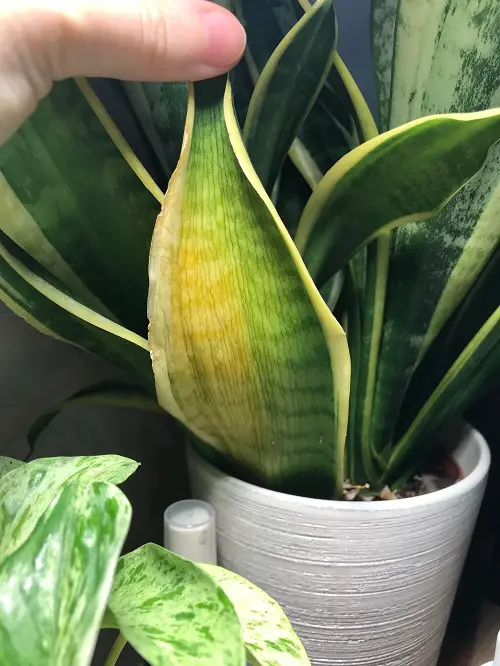
Snake plant is a succulent, and hates too much moisture. Overwatering will make its leaves go yellow in no time! It can also attract root rot and fungal issues, both of which can make the leaves suffer.
Go by the simple rule—water only when the top half inch of the soil goes a little dry to the touch. It will keep it healthy and safe!
3. Poor Drainage
Yellowing leaves in snake plants can be caused by poor drainage, which is mainly caused due to compacted soil. A container, with no drainage hole at the bottom to let the excess water escape, can make the matters worse.
Use a well draining potting mix to ensure the plant gets the ideal bled of nutrients, while keeping it safe from excess trapped moisture. Any container you pick, ensure it has a drainage hole at the bottom.
4. Improper Temperature
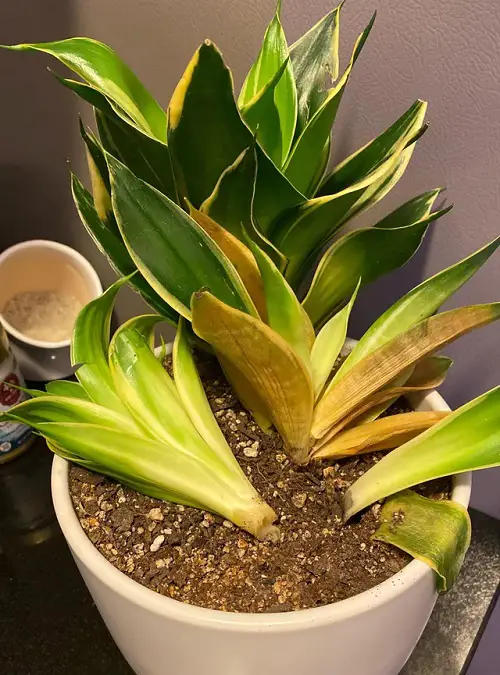
Snake plants thrive in warm temperatures, ideally between 60-90ºF (15-32ºC). If temperatures fall or go above this range, they may experience stress, and their leaves may turn yellow.
Keep the plant in a stable room temperature, away from the AC and heating vents. Also, make sure the leaves are not touching the window glass.
5. Improper Sunlight Exposure
Snake plants are often touted as being able to survive in low light conditions, but they actually thrive in bright, indirect light. Although they can tolerate shade, extended periods of low light can cause them to suffer, so it’s important to avoid keeping them in the dark spaces for too long.
Pick an east facing location—it will provide it with mild and direct morning sunlight for a few hours and then, with bright and indirect light for the rest of the day. A win-win for the plant to thrive!
Remember, too much direct sunlight, especially the afternoon sun exposure in warm areas, can make the leaves turn yellow and brown, as they will get burnt. If you have kept the plant near a window that gets direct sun exposure for long hours, use a curtain to diffuse the light.
6. Keep an Eye on Pesky Pests
Remember, snake plants are not immune to pest infestations. Sap-sucking insects like aphids, mealybugs, spider mites, and thrips can attack the leaves, puncturing them and sucking out the plant’s vital sap, making the foliage turn yellow, droopy, or even fall off.
It is important to remove pests as soon as they are spotted. A wet, soapy cloth can be used to wipe the insects off the plant, or you can spray them with insecticidal soap.
7. Take Care of the Water Quality
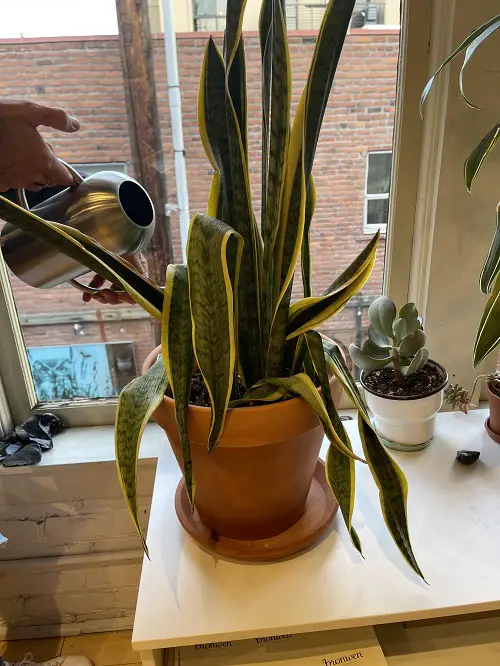
Too much salt and chemicals in the tap water can make the the roots clog, which can prevent the nutrient uptake in the plant, making the leaves turn yellow.
Keep the tap water overnight in a bucket to let the excess salts settle down. Better, use RO water.
8. Transplant Shock
If you have just re-potted the plant, the leaves might turn yellow due to the transplant shock. This happens due to the sudden change in the environment, and the new root enclosure.
After re-potting, avoid exposing the plant to direct sunlight, handle it gently during the process, and water only when the topsoil feels a little dry to the touch. Resume the normal routine after 2-3 weeks.
9. Age of Plant
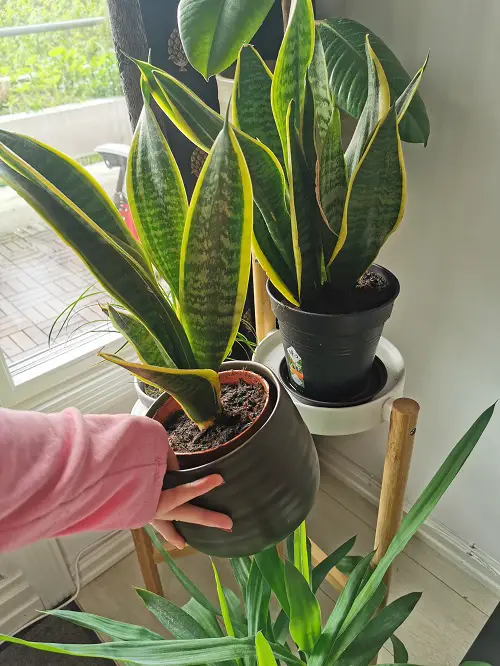
Snake plants, too, have a natural lifespan. As they grow and mature, it is normal for the outer leaves to yellow or brown, eventually dying off and making way for new growth. So, if you spot a few old leaves taking a yellow hue, its normal!


